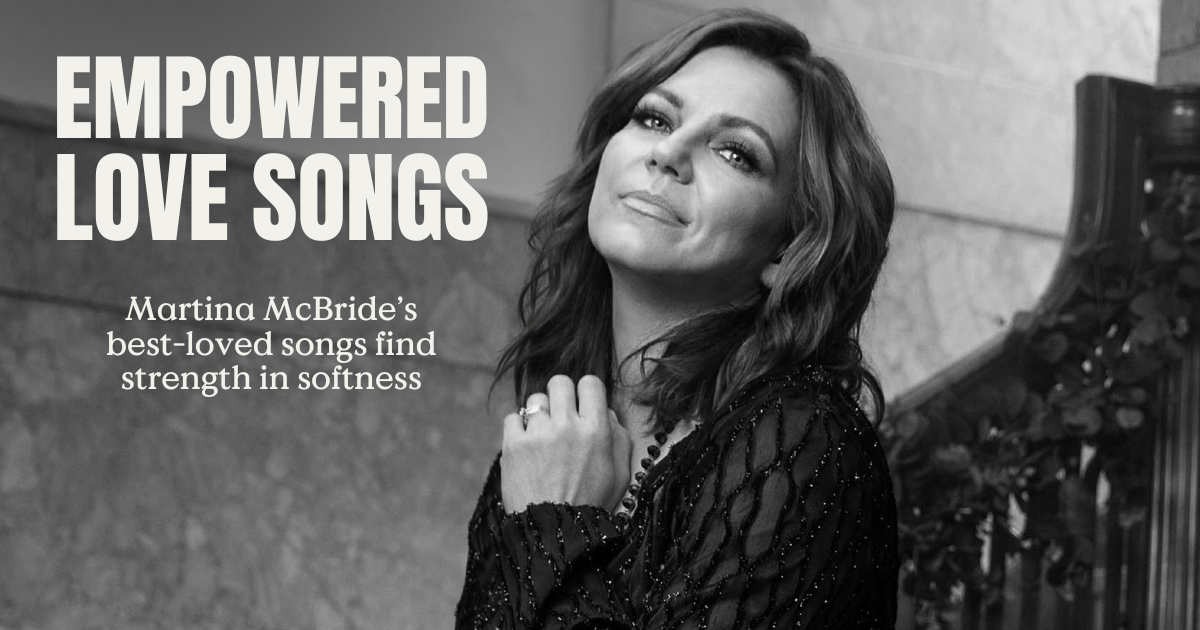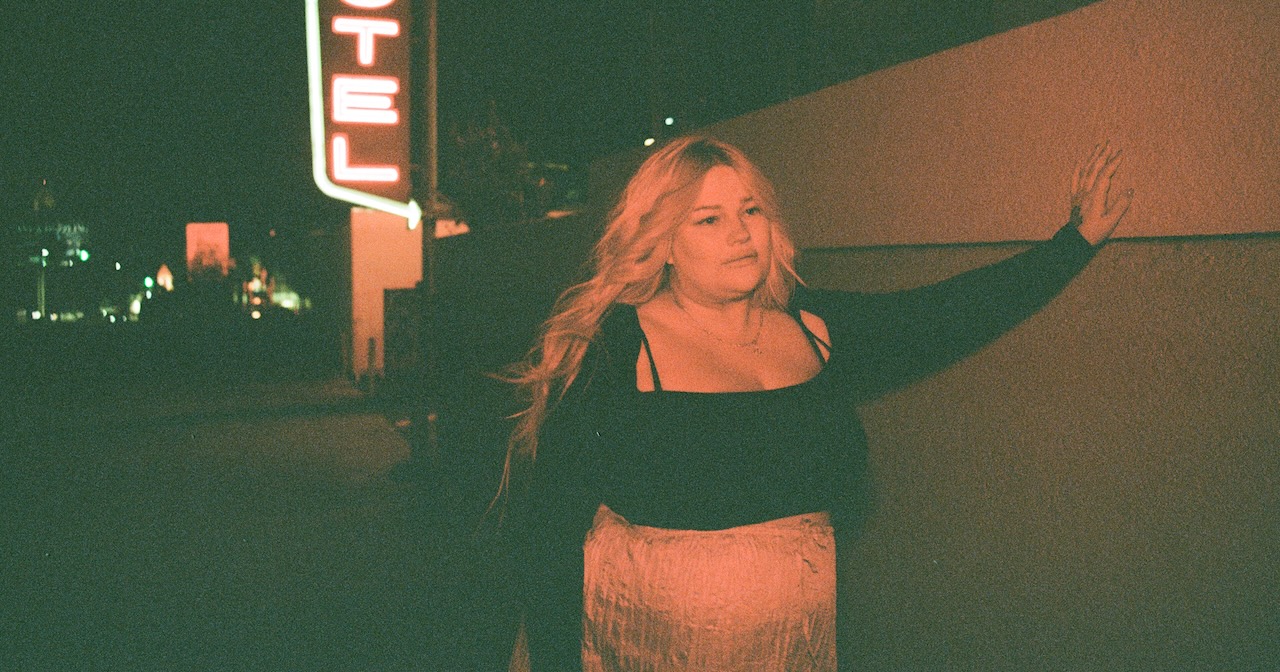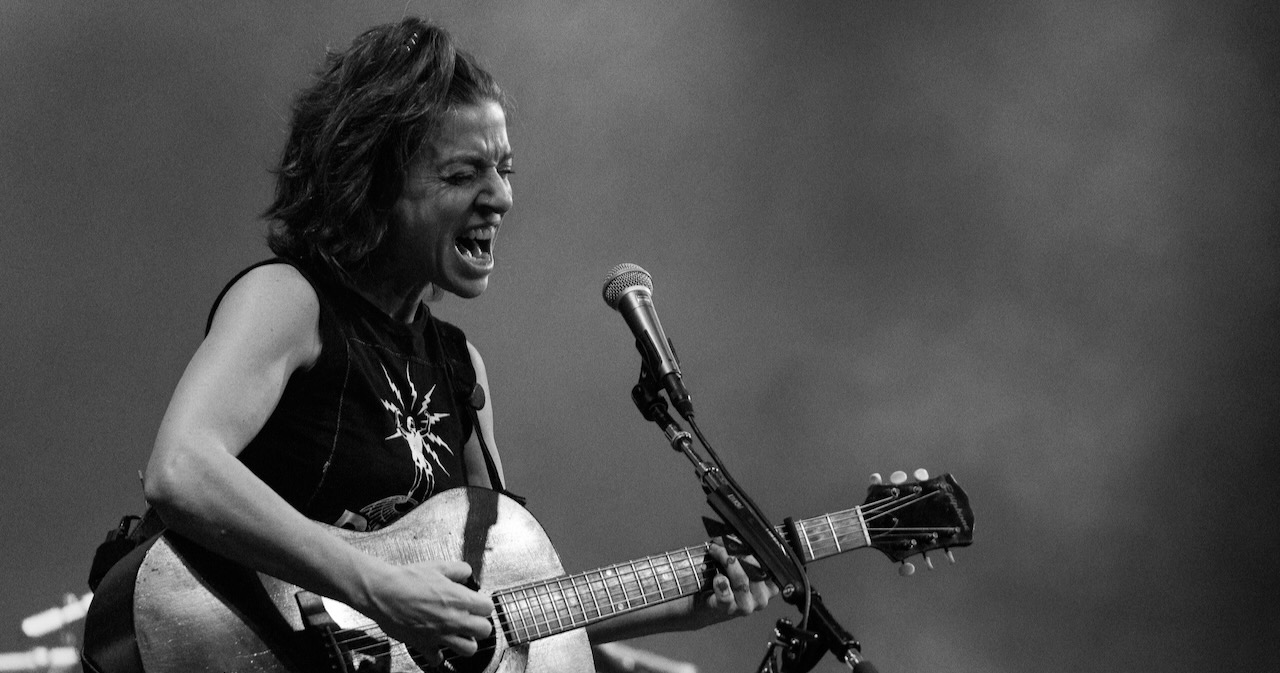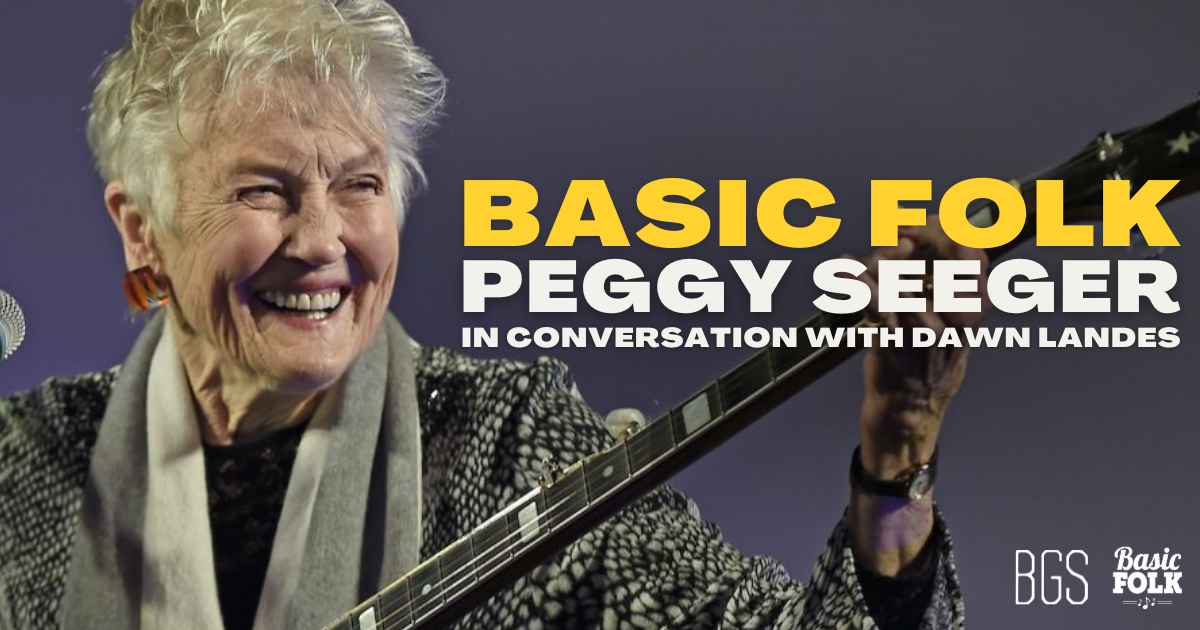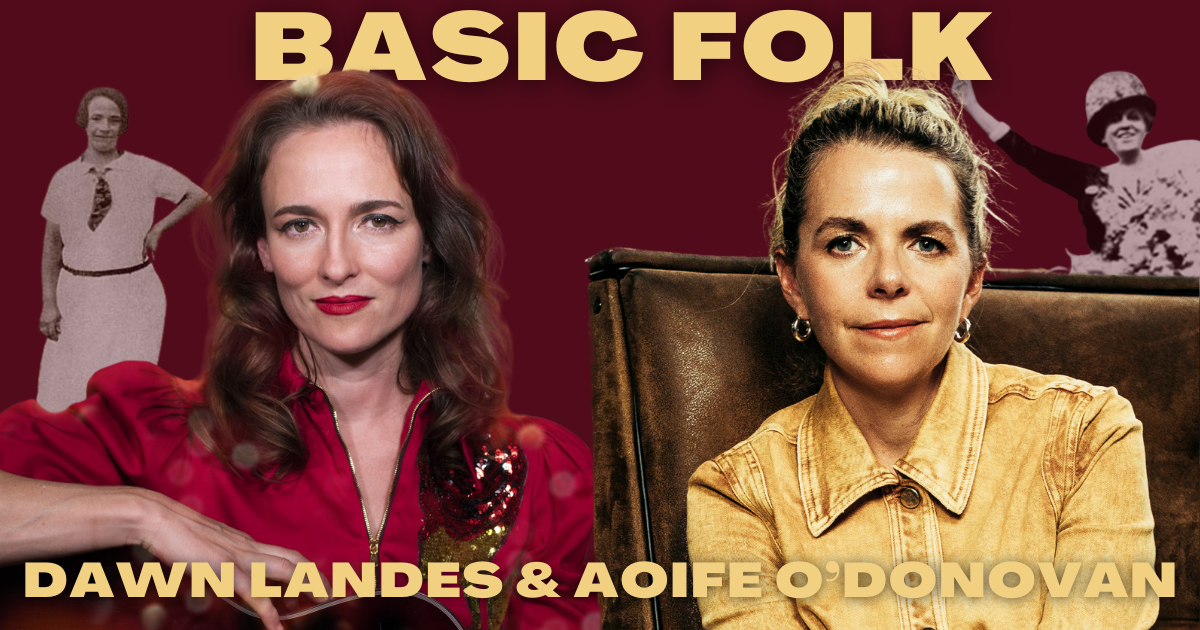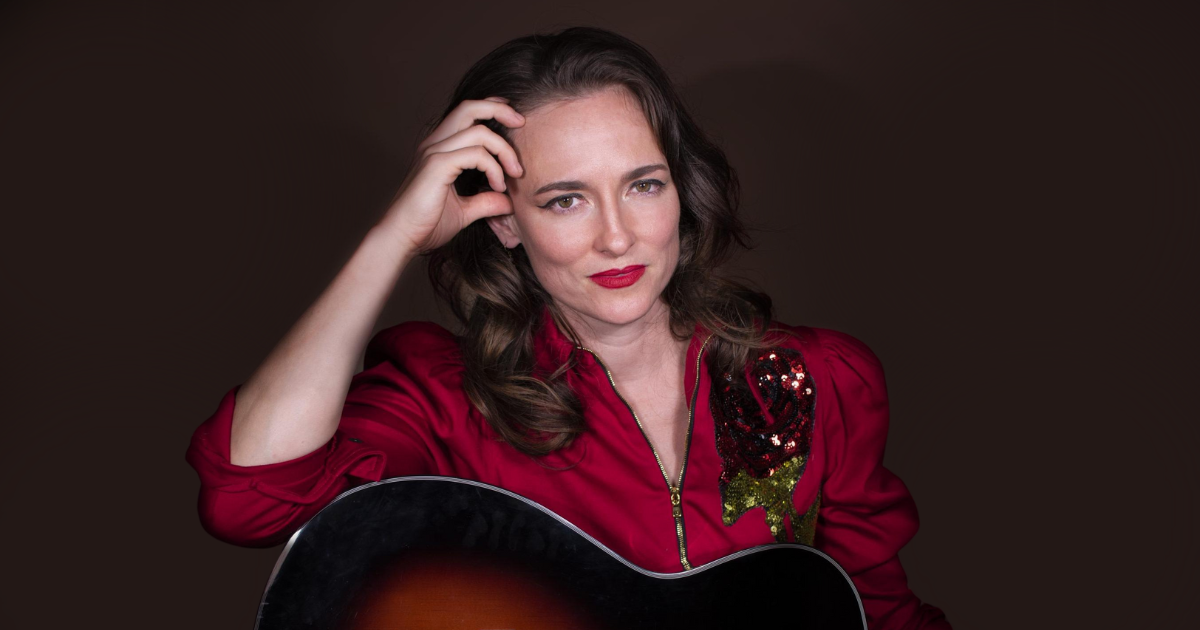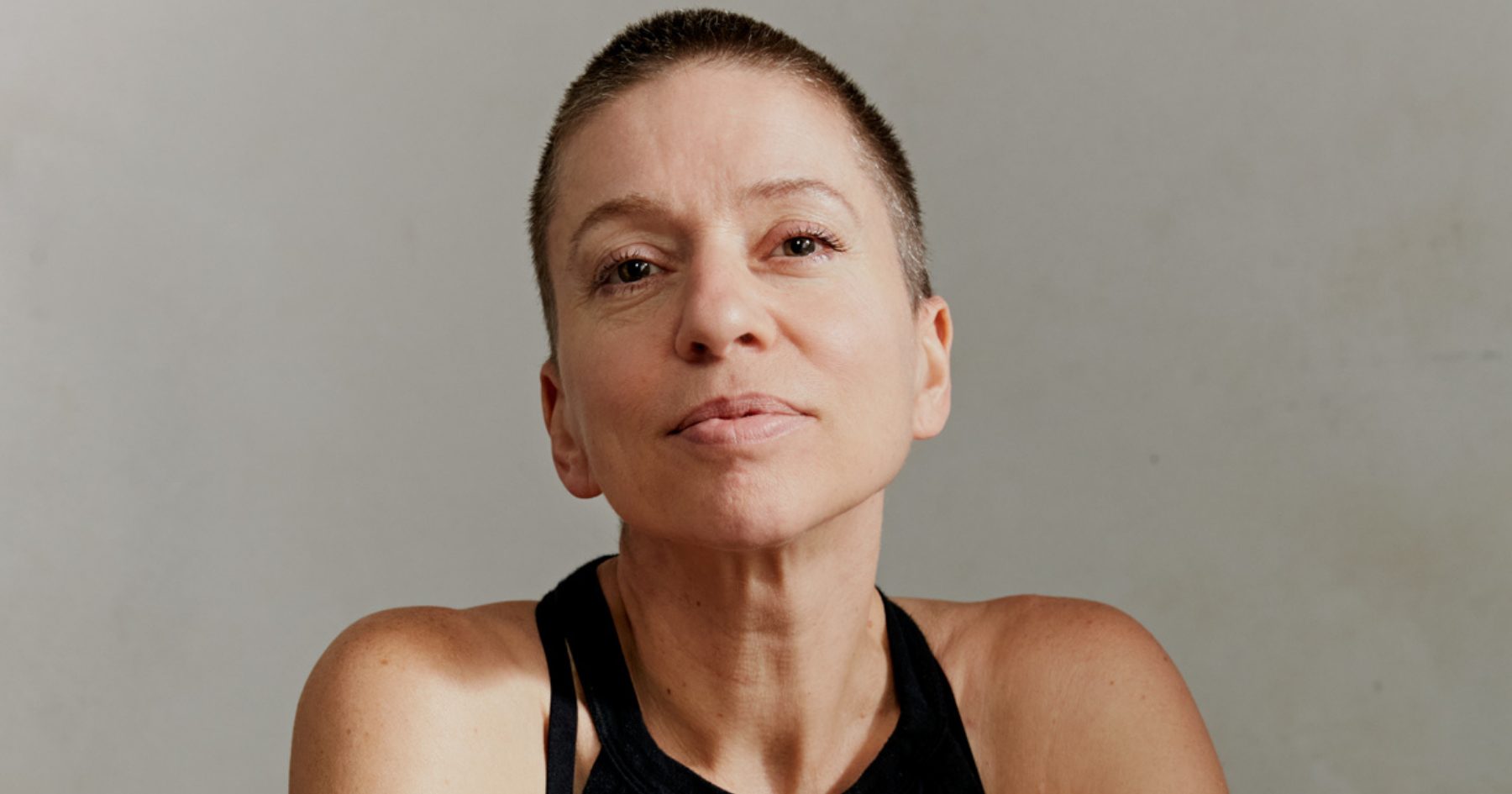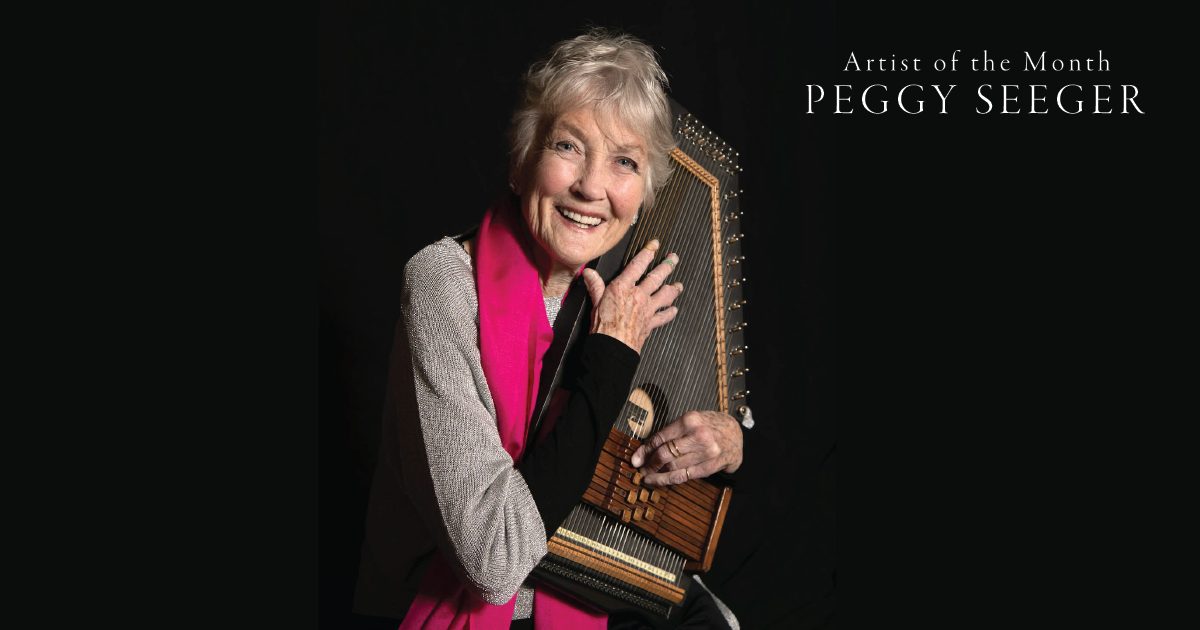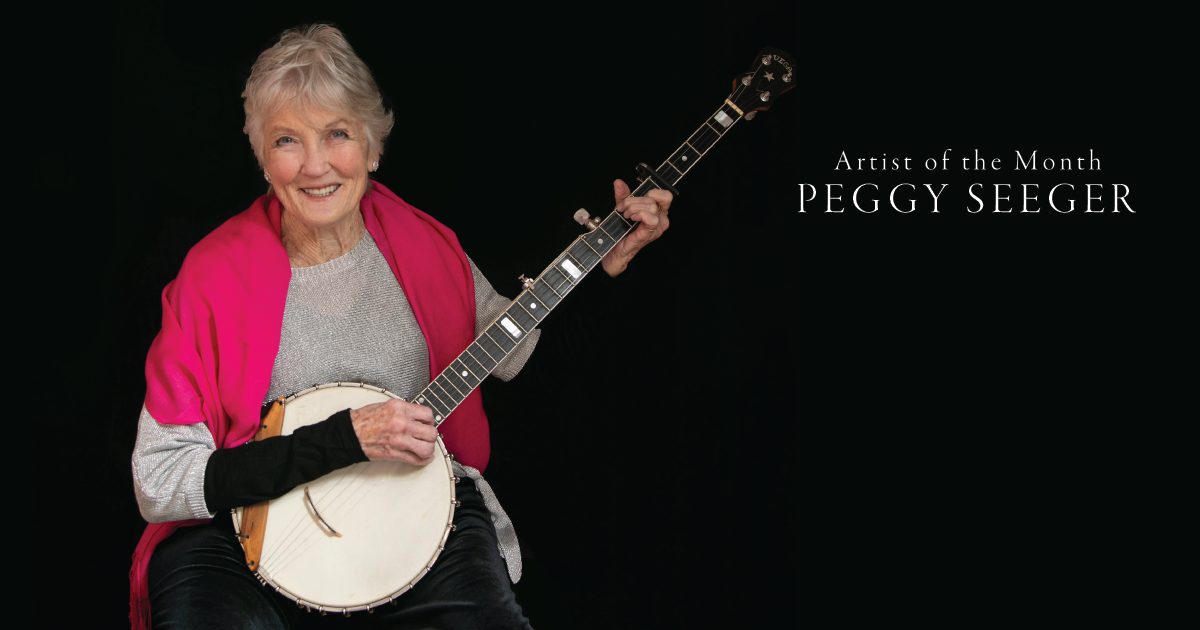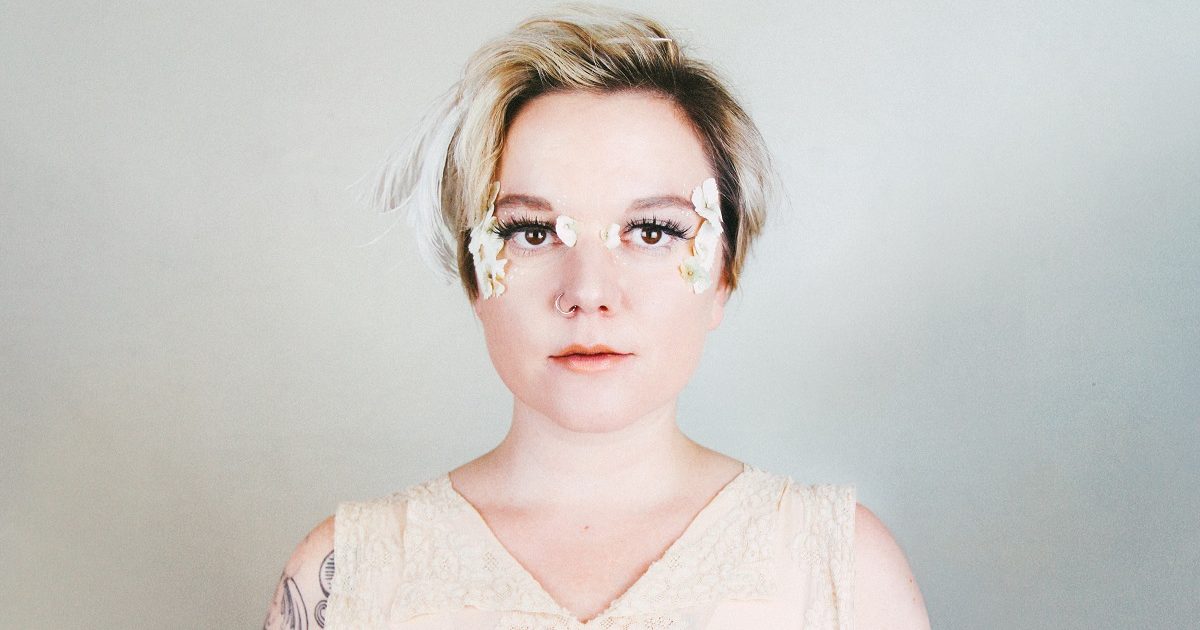Consult the comments section of any Martina McBride music video and you will find paragraph-length, highly personal expressions of adversity and triumph. These entries are varied, but often take the form of earnest tributes to lost loved ones, painful confessions of romantic loneliness or haunting stories of abuse and neglect. It’s a testament to the power of McBride’s voice – that inimitable instrument that arguably did more than anyone else’s to popularize the wide, throaty belt style now common among female country singers – that her songs still provoke such intensely emotional reactions.
It also speaks to her choice of material. Many of McBride’s best-loved songs operate on a grand emotional scale, and she has singularly foregrounded issues of domestic violence and child abuse in her work. But even as social issues songs largely define her legacy, she has most often recorded love songs, approaching them with the same shrewdness and self-assurance that colors her most celebrated work.
Take, for example, “Safe in the Arms of Love,” a number four hit from 1995’s Wild Angels. Written by female songwriting trio Mary Ann Kennedy, Pam Rose and Pat Bunch, “Safe in the Arms of Love” was originally released in 1986 by Wild Choir, a short-lived country-rock outfit fronted by Gail Davies. More new wave than country, the Wild Choir version features a prominent bassline, heavy drums and synths, and little of the warmth or joy that McBride’s would bring to the song years later. McBride’s version is twangier and more streamlined, trading the original’s raw energy for country-pop polish and sunny bursts of fiddle and mandolin.
The first line of “Safe in the Arms of Love” is bracing, almost a cliche but not quite: “My heart’s not ready for the rocking chair.” It’s an off-kilter choice of words, immediately followed by a clarification: “I need somebody who really cares.” This first couplet sets the rules for the rest of the song, which moves between metaphor and straight-ahead, conversational lyricism as McBride voices her desire for a stabilizing partnership.
An avowed hater of “wimpy woman” and “doormat” songs, McBride brings a resolve that makes clear she isn’t looking to be rescued. Rather, like the narrator of Lucinda Williams’ “Passionate Kisses” – a number four country hit for Mary Chapin Carpenter in 1992 — she’s simply voicing her desires. (It’s no accident that the song’s chorus begins with the words I want.) McBride’s delivery is confident, never beseeching or desperate. Do we ever doubt she’ll achieve her romantic goals?
The song’s music video takes place in a circus-themed fantasy world inhabited by Cirque du Soleil performers dressed as children’s entertainers. There is, notably, no love interest in sight. In fact, men rarely figure in McBride’s videos, at least not as love objects. The men in her videos tend to appear only in glimpses, as with the abusive husband and father figures in “Independence Day” and “Concrete Angel,” flashes of motion that connote menace. In the videos for her love songs, she is more often than not alone, less a protagonist than a guide figure.
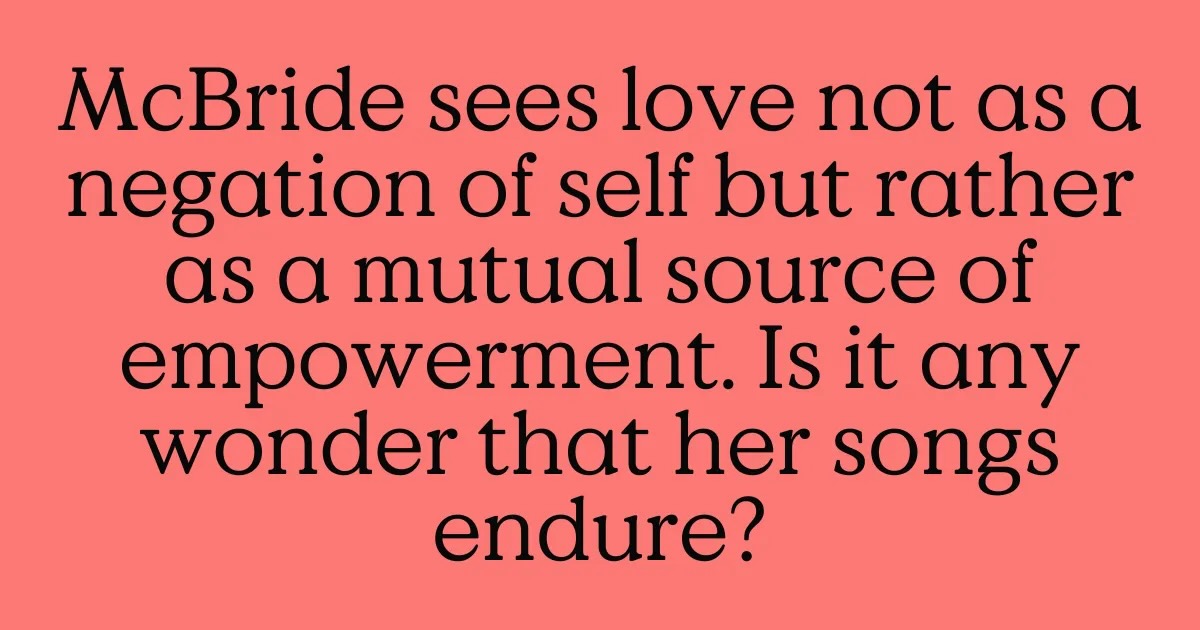
Consider the video for “Wild Angels” – filmed for whatever reason in a black and white, vérité style – which locates Martina on the roof of the Clock Tower Building in downtown Manhattan. The song is ostensibly about a couple whose bond prevails through thick and thin, but the video instead captures a group of citydwellers being visited by a mystical being. Then there’s the video for “My Baby Loves Me,” which features a barefoot Martina twirling in a floral dress as various, smiling couples pose behind an empty picture frame. (John McBride, Martina’s husband and long-time business partner, has a split-second cameo at the end of the video.)
Both “Wild Angels” and “My Baby Loves Me” continue the theme of the empowered love song. The rootsier “Wild Angels” presents a smartly egalitarian vision of love, with McBride expressing disbelief at her good fortune in finding such balance. “Somehow we wake up in each other’s arms,” she shrugs in the second verse before chalking it up to divine intervention in the song’s lofty, joyous chorus. The title track and opening song on McBride’s third album, “Wild Angels” also features the sound of McBride’s then-infant daughter Delaney giggling, a nod to the McBrides’ real-life love story and an indicator of how McBride would continue to foreground motherhood in her work.
Where “Safe in the Arms of Love” finds McBride searching for unconditional love, “My Baby Loves Me” takes the perspective of a woman who already has it. The song offers a typically country approach to beauty: fashion magazines, high heels, fancy clothes… who needs ‘em! It’s less feminist-presenting than, say, Shania Twain’s “Any Man of Mine,” but sets up a similar dynamic: This man is totally enthralled by me. In this country-pop version of the world, women run the show and men are their biggest cheerleaders.
Such was the utopian impulse of ‘90s country, particularly in the latter half of the decade, when a handful of female stars topped the charts nearly as often as their male peers and frequently sold more records. McBride was central to this moment and though she never quite reached the crossover heights of Twain or Faith Hill, she remained a steady presence on country radio even as the format purged female voices in the aughts and the wake of 9/11. She was in fact the only female country artist to notch a solo No. 1 during the entirety of 2002, a feat that wouldn’t be repeated until Gretchen Wilson took “Redneck Woman” to the top of the charts three years later. (This fact has depressing echoes of today’s hyper-masculine radio environment, in which it is nearly impossible for a woman to hit No. 1, even with the help of a male duet partner.)
To her detractors, McBride’s great sin at the turn of the millennium was her shift toward the smooth sounds of Adult Contemporary. She found great success in this format with “This One’s for the Girls” and “In My Daughter’s Eyes,” two hits from 2003’s Martina that reached No. 1 and No. 3, respectively. Critics have accused her of making “music for soccer moms,” an elitist term that equates suburban women with unrefined taste.
It’s true that McBride has at times leaned into inoffensive pop balladry, most successfully on “Valentine,” her hyper-smooth collaboration with pianist Jim Brickman that was her first brush with Adult Contemporary success in 1997. But to dismiss McBride’s music — which, yes, includes her honeyed love songs — as frothily unserious is to do a disservice to one of country’s great risk-takers. “Valentine” may not be hard-shell honky-tonk (for that, see cuts like “Cheap Whiskey” or her 2005 classic-country covers album, Timeless) but its softness isn’t a reason to reject it outright. It’s a symptom of country music’s eternal, exhausting authenticity debate that pop-leaning love songs, often the exact songs that allow women to break through country radio’s gender barrier and find commercial success, continue to be written off as superficial.
View this post on Instagram
To be fair, not all of McBride’s more commercial instincts are brilliantly rendered; “I Love You” still smacks of a “This Kiss” retread, while “There You Are” is bland even as piano ballads go. But for every “I Love You” or “There You Are,” there’s an “I’m Gonna Love You Through It,” a 2011 cut about a breast cancer survivor who finds strength in the selfless love of her husband.
With its sweeping, string-laden sound, “I’m Gonna Love You Through It” risks being the kind of “soccer mom” fodder that McBride and her female peers have long been dinged for. But it’s also lyrically sober and undeniably moving, the kind of serious story song that has all but disappeared from the format. The song gave McBride her last top ten country hit and final GRAMMY nomination to date, for Best Country Solo Performance. (In one of the music industry’s great injustices, McBride has 14 GRAMMY nominations and zero wins.)
“Just take my hand, together we can do it,” McBride sings in the chorus, returning to the egalitarian vision of love that made her ‘90s work so disarming. Here, as in “Wild Angels,” McBride sees love not as a negation of self but rather as a mutual source of empowerment. Is it any wonder that her songs endure?
Want more Good Country? Sign up on Substack to receive our monthly email newsletter – and much more music! – direct to your inbox.
Photo Credit: Martina McBride courtesy of Red Light Management.
